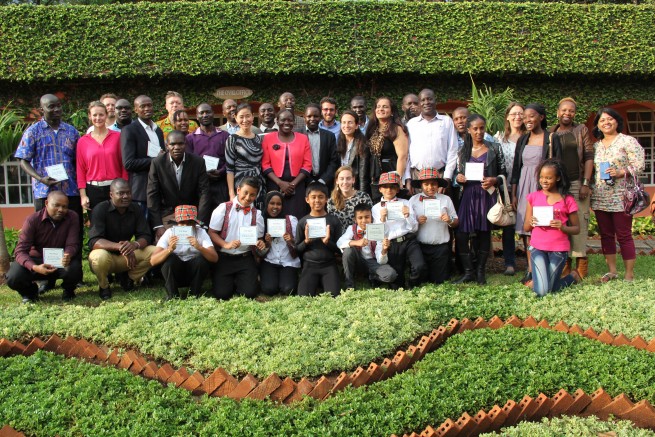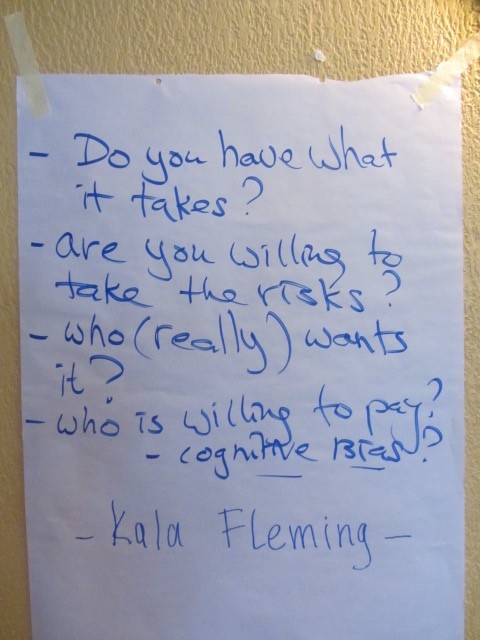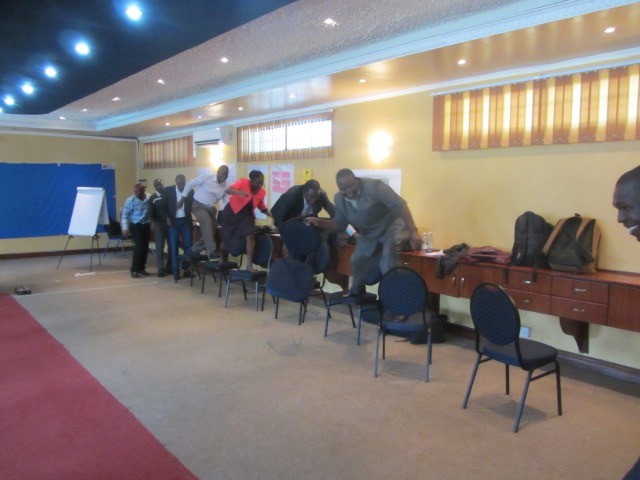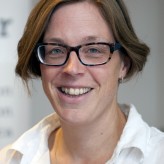Kenya Learning Tour
Impressions after two days full of exchanging ideas
 © Mugo Ephantus
© Mugo Ephantus
By Titia Wouters
25 participants, 13 innovations, 2 days, 1 place, those are the ingredients for a first ever Via Water Learning Tour. It took place in Nairobi, Kenya from 13 to 15 December 2015.
All the innovations presented - and thus all the people present - passed the first stage of VIA Water: they were found eligible to submit a full proposal. Our experience is that working towards that full proposal sounds easier than it is. It takes time and quite some hard work. For that process, it helps to spend two days elaborating on your ideas together with colleagues that experience the same issues. The training was moderated by two trainers of MDF consultancy and training, and on the second day Dutch experts were invited to give feedback.
How to summarise all that was learned and how to write that down to an audience like you that was not there? I am afraid I cannot transfer the good spirit in which this tour was conducted, the good laughs we had, the fierce discussions which could hardly be stopped by the moderators and the fun exercises we did to make us think creative. And the repetitive question of the moderators:' what did you learn from it….?', every single time, over and over again. Pui Yee, Michelle, thanks for that.
Let me try to summarise some of the learnings. Want to know more? Just post a message.
First exercise was pitching. Two key lessons:
1) practise, practise, practice, practice...
2) Three minutes, three slides.
Then I had the opportunity to elaborate on VIA Water. I won’t repeat all the details, but herewith some of the main messages I wanted to get across.
- Compose the right team. What expertise and competencies do you need to realise your ambition?
- Think about the sustainability of your project after conclusion. Is there a clear path to replication or business introduction?
- Make sure you have a clear knowledge agenda; define the most important questions and methodology to find answers
- Be clear in what you know and what you don’t know. Don’t make things nicer then they are
- Cherish your first followers - like this guy!
Kala Fleming, senior researcher at IBM Research challenged the group with the question 'so you want to be an entrepeneur?'. Main lessons from her side:

- Do you have what it takes? Meaning: is your innovation THE solution to the problem?
- Are YOU willing to take the risk? Be honest to yourself; do you really want to put in all the sweat and tears, time and money?
- Who (REALLY) wants it? Who is your customer, do you know him of her? Did you ask?
- Who is willing to PAY?
The exercise after that was about innovation. VIA Water keeps dragging about being innovative, creative, to think out-of-the-box, but those are big words with big meanings. Can you just be innovative like that? Is it a switch you can put on? Can you say ‘let’s be innovative between 4.00 and 5.00 pm this afternoon’? It does not work like that, we know, it is a constant state of mind which you can train and develop. How? For instance: take a different route to work every day, talk to somebody new instead of looking at your mobile checking out the latest headlines. It will certainly inspire you.
 Creative thinking: how to cross a river without getting your feet wet?
Creative thinking: how to cross a river without getting your feet wet?
And still the training wasn’t over: the last 'serious' part of the programme concerned a peer-to-peer review. Having a room full of experts in the water field, both from Kenya as well as from the Netherlands had to be used to the maximum; everybody gave feedback on pre-defined challenges of each of the 13 projects.
And again, what did we learn? If you want to get feedback from your colleagues, be specific in what you ask them, otherwise they won't be able to help you and give you the tips and trics you need. So not: 'I need funding', but: 'I am looking for x amount which I need to build this and this device or try out this and this pilot in the next x months, do you have contacts/investors/funds?'
And then there was the final treat; the closing ceremony. Gifted Kids Kenya (talking of an 'unusual suspect'!) presented their work. Over the past weeks the kids (age 12-16) filmed three of the applicants to the VIA Water programme: Hydroponics, Sanivation and TRACE. They wrote a script, went over to the premises of the projects and filmed. A delegation of the Gifted Kids came to the training venue to look at the premiere of the footage. And they also performed a small play to show us what they learned. That was what I would call an innovative combination, one that worked out very well. The footage is still being edited, but will of course appear on our website once finished.
And what did I learn being programme manager of VIA Water? I learned that getting to know the faces behind the paper application is crucial to success. It helps me better understand the ideas, the constraints, the concerns and the opportunities. Hope to meet you all soon again!
List of participants:
| Mr John Omare | Solicare |
| Mr Godwin Ruto | Solicare |
| Mr Lawrence Kimaru | SNV/VEI |
| Mr Laban Okeyo | SCODE Ltd |
| Mr Alfred Adongo | Sana international |
| Ms Caroline Murungi | Sana international |
| Mr George Owiti | Kisumu County Government |
| Mr Wycliffe Ouma | ICS Africa (Susteq, AKVO) |
| Mr Michael Odhiambo | ICS Africa |
| Mr Peter Chege Gichuku | Hydroponics Kenya |
| Mr Eric Mbugua | Hydroponics Kenya |
| Mr Alex Musyoka | Sasol Foundation |
| Mr Clement Manyulu | Amref |
| Ms Reena Shah | Greenergia ltd |
| Ms Risper Ndindi | Greenergia ltd |
| Mr John Kipchumbah | INFONET Africa |
| Mr Wesley Chirchir | Moi University Centre for Public Sector Reforms |
| Mr Dickson Ochieng | Sanivation |
| Mr Andrew Foote | Sanivation |
| Mr Gilbert Mwangi Kamau | TAHMO + SWC |
| Mr Mark de Blois | Upande |
| Ms Gladys Kitony | iHub |
| Mr Kevin Mureithi | TRACE |
